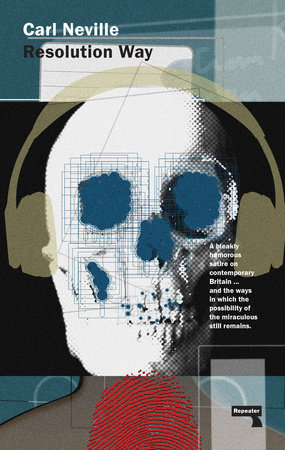You have no items in your cart. Want to get some nice things?
Go shopping
People can only bear a little reality. But then, you already know that. You’re a reader – such a reader, you’re not even reading a novel but a review of a novel – so chances are you don’t like reality any more than I do. For fans of speculative fiction and cult capers like Stone Junction and “London” novels, Carl Neville’s second novel Resolution Way arrives right on time.
The novel kicks off when we meet Alex Hargreaves: a middle-class novelist in near-future London, struggling to publish a follow-up to his critically-acclaimed debut. Alex is on the hunt for a lost author, but when he gets onto Vernon Crane’s trail he discovers an unpublished work – and decides to pass it off as his own. The hero glides with a cocaine hound’s confidence, the spectre of his reliance on a Ritalin-type psychedelic drug hovering over his increasingly passive pursuit of success.
After about a hundred pages we switch away from Alex to Paula Adonor, Vernon’s ex. The movement is clear and bold, Paula’s voice a break from Alex’s unrelenting self-absorption. Moving away from Alex gives the author to nod back to rave culture as an emotional touchstone for Paula, Vernon and their friends, whose perspective we switch to after Paula’s. There’s a lyricism in talking about dancefloors and gatherings and E highs that becomes the romance of the story, and the emotional motivation behind their fight for survival.
The novel is far from cheery and is powerfully motivated by themes of isolation – by both affluence and poverty – as well as loss. But besides both of those themes, hope prevails through courage, love and activism.
The hardest, most compelling thing about the novel was its satire. The novel produces a relentless reiteration of contemporary Britain’s failures and shortcomings: loneliness, poverty and anxiety dogging and trapping the characters at every step.
It’s like being dragged through Britain and forced to look unblinking at what you know and fear to be reality: that everything is being sold off and people being frightened into retreat to self-interest by swingeing cuts and draconian neoliberal economics. That anxiety is being weaponised against ourselves and people we love.
Writing about the closure of Fabric, London’s most recent defeat, Quietus co-founder Luke Turner put it:
The closure of Fabric is another loss in what feels like an increasingly bitter and difficult war between those of us who love, live and breathe culture ranged against the conformist force of hyper-capitalism and its useful idiots in positions of power.
Whether or not you ever went to Fabric, chances are that if you live in London and you have a pulse, you understand the need for every community to have somewhere to come together. Closing clubs, pubs and parks takes the heart out of the people – something Resolution Way expresses authentically and powerfully.
When searching for problems with the book, I could only muster remarks that were embarrassingly pedantic. The acknowledgements are too cool. The edit misses a few grammatical problems. The author reveals himself to be a gym-dodger when he sends a character to work out after breakfast (boak). The only problem that registered is that the characterisation of Alex’s partner Karen was a little faint: perhaps the author lacked curiosity about this character.
But like I said: “quibbles” is an overstatement. The story’s pacy, the setting is blisteringly horrible, the characterisation is confident, the dialogue packed.
TLDR: Resolution Way is a smart, imaginative thriller that promises escapism, and delivers something even more rewarding.
Resolution Way, 228pp., is published by Repeater Books (£8.99).

About Ellie Broughton
Ellie Broughton (elliebroughton@gmail.com) is an arts writer and copywriter with experience writing for The Guardian and Guardian Labs, The Huffington Post, The Independent and Vice. She is also the essays reader for Litro.
- Web |
- More Posts(6)




